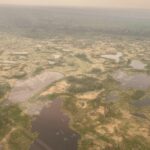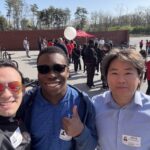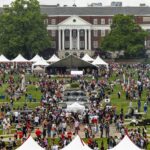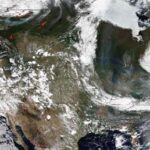The 6th International Conference on Atmosphere, Ocean, and Climate Change was held in Hong Kong from August 19-21, 2013. The conference brought together over 150 scientists from around the world – including 45 leading researchers – to share their latest scientific findings and technological breakthroughs in the broad disciplines of atmospheric, oceanographic, climate change and earth system sciences.
The conference was organized by the Chinese-American Oceanic and Atmospheric Association (COAA, http://www.coaaweb.org/) and hosted by the Chinese University of Hong Kong (CUHK). Incumbent COAA president, ESSIC / AOSC Professor Zhanqing Li and COAA secretary, ESSIC Assistant Research Scientist Jingfeng Huang, played major roles in organizing and convening the conference.
A main theme of the conference was on global change and regional responses. To put this in perspective, UMD ESSIC Director & ConE Chair, Professor. Busalacchi began the conference with a keynote talk introducing the World Climate Research Programme (WCRP) for which he serves as Chairman of the Joint Scientific Committee. His presentation was followed by a plenary talk by Dr. Guanhua Xu, the former minister of Science and Technology of China who introduced the Chinese programs/projects on global change. Eight conference themes were presented: Climate Change and Our Actions; Asian Monsoon; Aerosol and Climate; Cloud and Precipitation; Weather Forecasting and Data Assimilation; Ocean, Air-Sea Interaction and Climate; Climate Variability and Modeling; Remote Sensing. These topics of wide public interest drew much attention and coverage by the local media.
Professor Li, who will serve a 1 year term as COAA president for calendar year 2013, noted the importance of the organization’s continued participation in events at the international level, given its size and the expertise of its members. Li also felt that COAA’s demonstrated leadership at world-wide events such as ICAOCC, could stimulate the development of other relevant professional and social activities. He also encouraged more localized participation in the organization, given the greater D.C. area’s extensive concentration of oceanic and atmospheric scientists.
Similarly, current COAA Secretary and UMD ESSIC Researcher, Jingfeng Huang, felt that greater UMD affiliation with COAA-like organizations, could lead to new collaborations between university researchers and other science communities.
“COAA is a non-profit organization that helps bridge up communication channels among hundreds of colleagues, who are in the same or close areas of research internationally wide,” said Huang. “UMD’s involvement will not only facilitate this help, but also create more interactions between UMD researchers and many other colleagues from other universities or nations.”






